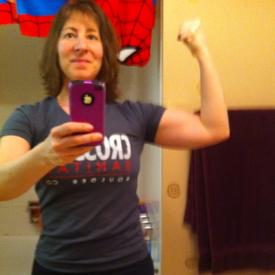Talk to me about "eating clean".

sbro32
Posts: 130 Member
So I'm about to start my mini marathon training next Saturday. I'm also on a weight loss mission. Got 16lbs to go! This will be my 6th mini, and so I know that losing weight during training can actually be a difficult thing. You need extra calories to replenish yourself after those especially long runs, and it can be tricky getting the number right - how many you need versus how many you actually spent and how many you should deprive yourself of to reach the appropriate deficit in order to lose weight but not malnourish yourself. Omigod, how many people just died from boredom after reading that. I'm so sorry. And if you're still alive, I apologize for the grammar too.
Anyhow, I still have a good amount to learn about nutrition. I've read a lot of your all's posts in regards to "eating clean". I'd like to get a discussion going about what this means to different people. Just avoiding processed foods? A certain vegetable to meat ratio? Taking a shower before you eat? - I had to do it.
I'd really appreciate your thoughts on this and any good eating tips for runners doing long distance training. I'd also love some running friends. Please add me!
Have a great Sunday, and thank you all!
Anyhow, I still have a good amount to learn about nutrition. I've read a lot of your all's posts in regards to "eating clean". I'd like to get a discussion going about what this means to different people. Just avoiding processed foods? A certain vegetable to meat ratio? Taking a shower before you eat? - I had to do it.
I'd really appreciate your thoughts on this and any good eating tips for runners doing long distance training. I'd also love some running friends. Please add me!
Have a great Sunday, and thank you all!
0
Replies
-
Eating clean for me is slim cuts of meat, fish, fresh veggies and fruit, no processed foods, no sodas, vitamins, and water. Lots of water. I log everything that I eat. It keeps me accountable.0
-
Here is a summary of my opinion on clean eating:
http://www.myfitnesspal.com/topics/show/822501-halp-my-sandwich-isn-t-clean0 -
To me it means no processed foods or aditives. Cooking from scratch.
Remember you must eat mostly lean foods but there are fats that you DO NEED, found in oils, fish, seeds and other sources.0 -
I do not use the concept of 'eating clean' as it is meaningless due to the fact that it is not a defined term and has too many variables. In addition, just because something does not fall under someone's definition of clean does not mean it is unhealthy or not conducive to someone's goals.
However, I do believe in having a diet that includes a good amount and good variety of nutrient dense foods. That will often mean that a good balance of your diet comprises minimally processed foods.0 -
Eating clean has different meanings to different people just as low carb or paleo or many other diet-related terminology does. For me it's a primarily wholefood diet, a balance of protein to healthy fats to carbohydrates appropriate the individual's activity levels or lifestyle or health concerns. It's not about eliminating entire food groups: many do permit processed foods like cheese, wholegrain breads or protein powders, sometimes as a large portion of the diet, but clearly there are different 'grades' of these, some cheeses are fairly natural or traditional others have all sorts of additives. It's generally a good sign if a food has one or two ingredients.
If you base your diet around nine servings of fruits and vegetables in the full rainbow of colours, three servings of dairy, oily fish ideally daily, other healthy fats in their whole form (avocado, nuts, seeds, olives, block creamed coconut, cocoa powder), protein at every meal and snack, regular intake of mineral rich foods (nuts, seeds, beans, lentils) you should get all the nutrients your body needs.0 -
Here is a summary of my opinion on clean eating:
http://www.myfitnesspal.com/topics/show/822501-halp-my-sandwich-isn-t-clean
^^^ Great summary! :bigsmile:0 -
IMO its eating a what fits your macros0
-
SideSteel - Super informative. Thanks!0
-
Here is a summary of my opinion on clean eating:
http://www.myfitnesspal.com/topics/show/822501-halp-my-sandwich-isn-t-clean
Glad you posted that link; interesting read.
OP, I have a friend that was (is) in the same situation as you are; she needs to drop about 30 pounds but she also runs half/full marathons every few months. She hasn't had much luck with the weight loss but she's also 56 years old which I'm sure is making it more difficult.
IMO the best thing to do is be happy with maintaining during your training then maybe a week after your run do the TDEE - 20% math until it's time to train again.
Oh, the question...clean eating. Eh. Fruits/veggies, lean meat/protein, lowish unprocessed carbs I suppose. Right now I am trying to focus on the calories in vs calories out part. Once I get that down right I'll rethink the "clean eating" process.0 -
Learning a lot from all of your responses. I didn't know it was such widely discussed topic already. I really appreciate the feedback!0
-
I run a lot and have no problem losing weight when I want to. I set my calories at a deficit based on sedentary lifestyle, track calories burned during exercise and add those calories back in. Simple really
 0
0 -
Eating clean has different meanings to different people just as low carb or paleo or many other diet-related terminology does. For me it's a primarily wholefood diet, a balance of protein to healthy fats to carbohydrates appropriate the individual's activity levels or lifestyle or health concerns. It's not about eliminating entire food groups: many do permit processed foods like cheese, wholegrain breads or protein powders, sometimes as a large portion of the diet, but clearly there are different 'grades' of these, some cheeses are fairly natural or traditional others have all sorts of additives. It's generally a good sign if a food has one or two ingredients.
If you base your diet around nine servings of fruits and vegetables in the full rainbow of colours, three servings of dairy, oily fish ideally daily, other healthy fats in their whole form (avocado, nuts, seeds, olives, block creamed coconut, cocoa powder), protein at every meal and snack, regular intake of mineral rich foods (nuts, seeds, beans, lentils) you should get all the nutrients your body needs.
Very helpful, thanks.0 -
Here is a summary of my opinion on clean eating:
http://www.myfitnesspal.com/topics/show/822501-halp-my-sandwich-isn-t-clean
I read the article and there's a word in there I've never seen before and can't find in any dictionary. What's an "orthorexic?"0 -
Here is a summary of my opinion on clean eating:
http://www.myfitnesspal.com/topics/show/822501-halp-my-sandwich-isn-t-clean
I read the article and there's a word in there I've never seen before and can't find in any dictionary. What's an "orthorexic?"
http://en.wikipedia.org/wiki/Orthorexia_nervosa0 -
To me, "eating clean" means that I eat mainly whole foods that I prepare myself, with no chemical processing or additives. I go be the adage "If it grew from a plant, eat it; if it was produced in a plant, don't. I do not consume any protein powders or any supplements either.
I do eat in restaurants on occasion, but I ask where the food came from and how it was prepared. I don't eat any fast food.
I don't consider this restrictive at all. If I want cake, I'll bake one.0 -
Where are you going to get the ingredients to bake a cake? Baking powder and soda, made in plant, flour, made in plant, sugar or stevia or whatever you would use, made in a plant etc.0
-
Here is a summary of my opinion on clean eating:
http://www.myfitnesspal.com/topics/show/822501-halp-my-sandwich-isn-t-clean
Great post, Sidesteel. I agree with most, but I think you mix two different concepts... clean eating, and eating to your macros (IIFYM, as you say).
I totally agree that "clean eating" is a subjective term, and defined differently based on different food philosophies. A vegan would not consider meats "clean". Your example was great... someone eating strict Paleo would object to those oats and milk. While plenty of other people would consider whole grains or low-fat milk to be perfectly "clean".
In your example of the bodybuilder eating Pop-tarts as a pre-workout food, I think what you're saying is that he finds it to be totally OK for him to eat, because it fits within his macros, and he's made a decision to eat something that he enjoys before his workout. Does that make the Pop-tart clean? I don't think so. I would find it hard for anyone to argue that these ingredients are "clean":
Strawberry pop-tart:
Wheat Flour Enriched (Wheat Flour, Niacinamide (Vitamin aB), Iron Reduced, Thiamine Mononitrate (Vitamin B1), Riboflavin (Vitamin B2), Folic Acid (Vitamin aB)) , Corn Syrup, Corn Syrup High Fructose, Dextrose, Soybean(s) Oil Partially Hydrogenated and/or, Cottonseed Oil, Crackermeal Contains 2% or less of the Following: (, Wheat Starch, Salt, Strawberry(ies) Dried, Apple(s) Dried, Pear(s) Dried, Leavening (Baking Soda, Sodium Acid Pyrophosphate, Monocalcium Phosphate) , Citric Acid, Wheat Starch Modified, Corn Starch, Caramel Color, Xanthan Gum, Soy Lecithin, Niacinamide (Vitamin aB), Iron Reduced, Red 40, Yellow 6, Vitamin A Palmitate, Pyridoxine Hydrochloride (HCL), Riboflavin (Vitamin B2), Thiamin Hydrochloride (Vitamin B1), Folic Acid (Vitamin aB)
Yes, there are some good nutrients in there because it's fortified with some vitamins. But... I don't consider corn syrup, high fructose corn syrup, partially hydrogenated soybean and/or cottonseed oil, caramel color, xanthan gum, soy lecithin, red 40, yellow 6 particularly "clean". Generally, anything with an ingredient list that long is not going to be "clean" by most definitions. It might, though, still fit within your macro goals.
My point is that if you choose to eat a Pop-tart (or anything else) because you enjoy it, and your diet plan is simply to stay within a certain macro range... than eating a Pop-tart may be fine. But, that doesn't make the Pop-tart "clean".
I know you don't like labeling any food as "good" or "bad". But there are foods that can promote health, and some that do not. Does that mean that you shouldn't eat it? Well, that depends on your food philosophy. I wouldn't, because I'd be using up calories for something that isn't really filling, isn't really very nutritious, might upset my stomach, and in the end, isn't really "worth it" for me. If I ABSOLUTELY LOVED Pop-tarts... I might make that my "exception" and treat with it. If my food philosophy is to eat 80/20 clean, then I might just make that part of my 20%. I still wouldn't consider it clean.
Not trying to argue.. just trying to make the distinction between clean eating and eating within macros (or eating within a food philosophy).
Now, my personal definition of "clean eating" is eating foods that have minimal ingredients, made up of actual foods that grew somewhere, or that had a face at one time.0 -
Here is a summary of my opinion on clean eating:
http://www.myfitnesspal.com/topics/show/822501-halp-my-sandwich-isn-t-clean
Great post, Sidesteel. I agree with most, but I think you mix two different concepts... clean eating, and eating to your macros (IIFYM, as you say).
I totally agree that "clean eating" is a subjective term, and defined differently based on different food philosophies. A vegan would not consider meats "clean". Your example was great... someone eating strict Paleo would object to those oats and milk. While plenty of other people would consider whole grains or low-fat milk to be perfectly "clean".
In your example of the bodybuilder eating Pop-tarts as a pre-workout food, I think what you're saying is that he finds it to be totally OK for him to eat, because it fits within his macros, and he's made a decision to eat something that he enjoys before his workout. Does that make the Pop-tart clean? I don't think so. I would find it hard for anyone to argue that these ingredients are "clean":
I'm not claiming the pop tarts are clean from anyone's point of view.
The first part of the article addresses why clean eating is ambiguous and then I go into nutrient density and viewing the diet as a whole. I'm not claiming pop tarts to be a clean food, I'm saying that the entire concept of "clean" vs "unclean" is largely irrelevant.
In talking about the Pop-Tarts I was trying to illustrate context as an aside from the "clean" vs "unclean" dichotomy.0 -
Listen to sidesteel and his read his other articles he nails it dead on. Just follow IIFYM and your be fine0
-
Well said Caribougal!0
-
Snip.
I'm not claiming pop tarts to be a clean food, I'm saying that the entire concept of "clean" vs "unclean" is largely irrelevant.
In talking about the Pop-Tarts I was trying to illustrate context as an aside from the "clean" vs "unclean" dichotomy.
Ok, gotcha. But having a definition for eating clean/unclean is not irrelevant for someone who wants to maximize their intake of the most nutrient-dense foods. If that's your goal, then it's helpful to have a personal definition of "clean" so you can make appropriate food choices. I think that's what the OP was asking for.
Maybe it's just the term "clean/unclean" you don't like, because it seems so judgmental? If we don't call it clean, and we call it "nutrient-dense" and non-nutrient-dense", is that better? Semantics.
So, for the OP... Foods that are nutrient-dense, foods that don't have lots of chemicals to preserve them or make them look or taste like an actual food, are "clean". But, as Sidesteel says, you can eat non-nutrient-dense (aka processed) foods too. They may not be very nutritious, but if you want to eat them because they taste good, or because they're cheap, or whatever... That's up to you. But that has nothing to do with eating "clean". That has to do with fitting those foods in the context of your entire diet.0 -
Snip.
I'm not claiming pop tarts to be a clean food, I'm saying that the entire concept of "clean" vs "unclean" is largely irrelevant.
In talking about the Pop-Tarts I was trying to illustrate context as an aside from the "clean" vs "unclean" dichotomy.
Ok, gotcha. But having a definition for eating clean/unclean is not irrelevant for someone who wants to maximize their intake of the most nutrient-dense foods. If that's your goal, then it's helpful to have a personal definition of "clean" so you can make appropriate food choices. I think that's what the OP was asking for.
Maybe it's just the term "clean/unclean" you don't like, because it seems so judgmental? If we don't call it clean, and we call it "nutrient-dense" and non-nutrient-dense", is that better? Semantics.
So, for the OP... Foods that are nutrient-dense, foods that don't have lots of chemicals to preserve them or make them look or taste like an actual food, are "clean". But, as Sidesteel says, you can eat non-nutrient-dense (aka processed) foods too. They may not be very nutritious, but if you want to eat them because they taste good, or because they're cheap, or whatever... That's up to you. But that has nothing to do with eating "clean". That has to do with fitting those foods in the context of your entire diet.
It's partially semantics and partially the neglect to consider the entire diet. I favor nutrient dense vs not nutrient dense because this doesn't create a good/bad dichotomy.
So yes it's partially semantics but as I state in my write-up, there's other crap that goes with it that I dislike.0 -
For me, eating clean is just eating food made from scratch, nothing exceptionally processed (homemade spaghetti with homemade bolognese is fantastic, Chef Boyardee tinned spaghetti with meatballs not so much). For me, the fewer ingredients, the better. If it has a lot of ingredients, it should be because I put them there.0
-
You guys are a wealth of information! I really appreciate everyone's time and input. I learn a great deal from this site!0
This discussion has been closed.
Categories
- All Categories
- 1.4M Health, Wellness and Goals
- 398.4K Introduce Yourself
- 44.7K Getting Started
- 261K Health and Weight Loss
- 176.4K Food and Nutrition
- 47.7K Recipes
- 233K Fitness and Exercise
- 462 Sleep, Mindfulness and Overall Wellness
- 6.5K Goal: Maintaining Weight
- 8.7K Goal: Gaining Weight and Body Building
- 153.5K Motivation and Support
- 8.4K Challenges
- 1.4K Debate Club
- 96.5K Chit-Chat
- 2.6K Fun and Games
- 4.7K MyFitnessPal Information
- 17 News and Announcements
- 21 MyFitnessPal Academy
- 1.5K Feature Suggestions and Ideas
- 3.2K MyFitnessPal Tech Support Questions















